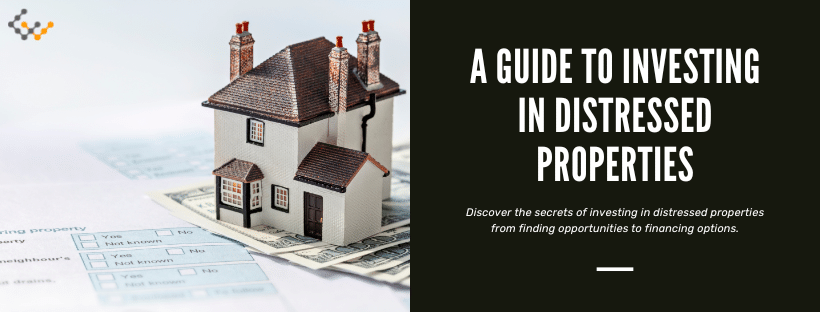A Guide to Investing in Commercial Distressed Properties

Commercial real estate presents a wealth of opportunities, but perhaps none offer potential returns equal to those of commercial distressed properties. For those who know how to identify promising distressed properties and purchase them, there are often substantial gains to be made.
If you’re still unfamiliar with this aspect of commercial real estate investing, here’s a guide to investing in commercial distressed properties.
Answer a few questions and get custom mortgage quotes. We'll match you with offers from our network of 650+ lenders.
What is a Distressed Property?
A distressed property is most specifically one that’s under threat of foreclosure due to the inability of the property owner to meet financial obligations, typically mortgage payments. In some cases, the property may already have been foreclosed on and be held by the bank,
More generally, distressed properties also include properties that need substantial repairs or renovations. Their current state of disrepair makes them unviable for most use, and thus unsellable as far as many potential buyers are concerned. The financial state of a property more correctly marks it as distressed than its actual condition does, though.
4 Types of Distressed Properties
Commercial real estate investors primarily consider four broad categories of distressed properties: foreclosures, short sales, owned properties and auctions.
1. Foreclosure Properties
Foreclosure is a legal process wherein the lender attempts to recover the balance of a loan from the borrower. This is also a fulcrum around which other types of distressed properties hinge.
The actual foreclosure process involves the lender seizing the property from the borrower, which can be done because the property is collateral for the unpaid loan. By the time a property reaches foreclosure, the owner is seriously behind on their mortgage payments.
A foreclosed property is one that’s currently held by the lender. The lender has already taken possession of the property, and is looking to offload the property as efficiently as possible. If there’s an option for the lender to sell the property quickly, they’re often inclined to do so.
Investors may be able to secure a foreclosed property from a lender for much less than the property is worth. The lender would rather recapture what they can from the property, and not carry the property on their books.
2. Short Sales
A short sale occurs before foreclosure actually takes place. Foreclosure may be imminent at this point, but it hasn’t yet happened. The property is therefore still the owner’s (and not the lender’s), and the owner is now an extremely motivated seller.
The short sale is when the property owner sells a property that’s in default, with the agreement of the seller. The term stems from the property almost always being short of fair market value.
Because both property owners and lenders are involved with a short sale, the deal itself can be slightly more complex than a foreclosure. All parties are still highly motivated, though. Owners don’t want to actually be foreclosed on, and lenders would prefer to avoid the work involved with actually foreclosing.
How much of a deal a foreclosure is depends on the property, its value, the outstanding loan balance, the seller’s ability to pay some of the loan balance, and the lender’s willingness to accept less than the balance.
Some short sales are very good for the purchasing investor, while others are moderately advantageous. At the very least, a short sale gives investors access to distressed properties fairly early on in the process.
3. Real Estate Owned (REO)
Real estate owned (REO) is now owned by the bank, post-foreclosure. Lenders often quickly put foreclosed properties up for auction (see next section), so many REO properties were foreclosed on and then failed to sell at auction. Not all REO has been to auction, however.
A lender’s primary goal with REO is usually to offload it as quickly as possible. These can be some of the best deals for investors, because lenders will usually accept a lower price in exchange for a faster sale.
4. Auctioned Properties
Auctioned properties may be foreclosures that a lender holds, a lender’s REOs or properties with past-due tax liens. In either case, the lender or government has a strong desire to quickly sell the properties — hence the auction.
Auctioned properties can go for well below their market value, but many auctions have reserves that ensure they don’t get sold for virtually free.
Pros and Cons of Buying Distressed Properties
As with any class of commercial real estate, there are both advantages and disadvantages to buying distressed properties.
Advantages
- Highly motivated sellers with virtually all types of distressed properties
- Below-market values provide an opportunity for quick and substantial appreciation
- Lower acquisition cost allows investors with less capital to access properties
- Sometimes present tax advantages, depending on local and state laws
Disadvantages
- The acquisition process can be a complex and time-consuming legal process
- Additional costs, such as taxes or legal fees, might have to be paid
- Properties are often in non-ideal and sometimes downright bad condition
- Investors often don’t have all of the details about a property when purchasing
How to Find Distressed Commercial Properties: 5 Tips
Investors who want to find distressed commercial properties will increase their likelihood of success with these tips.
- Contact Local Real Estate Agents: Local real estate agents often have extensive networks and insider information about upcoming distressed properties.
- Check Foreclosure Listings: Banks and other financial institutions typically list foreclosure properties on their websites.
- Monitor Local Newspaper Listings: Distressed properties, particularly foreclosures, are often advertised in local newspapers as part of legal notices.
- Network with Other Investors: Other real estate investors, regardless of the types of properties they prefer, might provide valuable leads.
- Use Online Real Estate Platforms: Numerous online platforms aggregate information about distressed properties, providing a one-stop shop for potential investors.
Financing Options for Commercial Distressed Properties:
Obtaining financing for distressed properties can sometimes be more challenging because these properties often aren’t in great condition. However, investors usually don’t have to get as much financing as they would if purchasing a non-distressed property.
The exact financing will depend on the specifics of a property. Investors should explore all the financing options available to them to see which is best for the specific property they’re purchasing.
Distressed Property Investment: What to Do and What to Avoid?
Do make sure you’ve done as much due diligence as possible. You may have to accept unknowns, but those should be minimized as much as possible.
Do be proactive in looking for distressed properties, as simply finding them can be most of the challenge toward getting one.
Don’t rush into anything without thoroughly understanding risks, costs and all other related factors. There are other distressed properties if you miss one.
When is the Best Time to Buy a Distressed Property?
The best time to purchase a distressed commercial property is whenever one becomes available. Availability might follow economic cycles to some degree, but there are almost always businesses and investors that face financial hardship. If you find a promising distressed property for sale, go for it as soon as you learn of the opportunity.
Wrapping Up:
Investing in commercial distressed properties can be a lucrative endeavor for those willing to navigate the associated complexities and risks. Your efforts will likely be well rewarded if you’re willing to learn about this space within commercial real estate investing.

